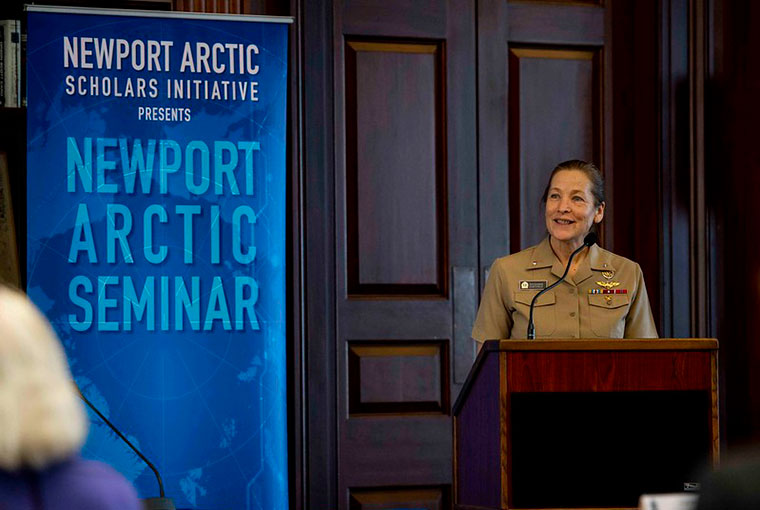Newport Arctic Scholars Initiative Returns for 2nd Round of Work on Arctic Security Issues

NEWPORT, R.I. – U.S. Naval War College’s Newport Arctic Scholars Initiative held a three-day seminar Jan. 22-24 to kick off its second round of work on Arctic security issues.
The event gathered 28 scholars and military professionals to discuss a region where melting ice has created a new competitive landscape as nations vie for influence and access to natural resources.
“Military activity in the Arctic is increasing in response to economic and strategic risks in the region. In the years to come, the maritime security forces of all Arctic states will play a more prominent role,” said Rear Adm. Shoshana S. Chatfield, president of the Naval War College, in remarks that opened the event.
Over the next year, this class of 20 Newport Arctic Scholars is expected to build on previous work from 2018-2019 that resulted in more than 30 principles for better Arctic cooperation in an era of great-power competition.
Those principles describe a need to raise awareness of the Arctic’s security challenges and call for more confidence-building activities among stakeholders. They also suggest that nations should recognize that new maritime and naval capabilities will be required to meet national interests in the Arctic without triggering friction.
For this year’s group of scholars, one of the principal topics will be discussion of whether existing regional organizations and forums are enough to address political-military issues in a changing Arctic.
“Our goal here together is to inform the development of a mechanism whereby accidental conflict and unintended escalation can be prevented,” Chatfield told the group.
Associate professor Walter Berbrick, co-lead scholar of the Arctic Scholars initiative, said he expects the group to deliver more findings and recommendations this year.
For video highlights of this seminar, please see:
'VIDEO: Newport Arctic Seminar Highlights.'
The results will not represent official policy for any of the nations who are participating, he noted. “Rather, we are providing starting points for discussing and engaging,” Berbrick told the group in his keynote speech Wednesday.
“The world is waking up to a changing Arctic whether we like it or not. And it falls to us, especially nations and navies who call the Arctic home, to make sense of this change – the miscalculations, the friction points and the catalysts to instability resulting from this change,” Berbrick said.
“The question, therefore, is: What frameworks are optimal to maintain open lines of communication, prevent and manage conflict, and increase security cooperation among nations and navies operating in and through the Arctic? That is our intellectual challenge,” he said.
Lars Saunes, retired chief of the Royal Norwegian Navy, outlined some of the challenges in the Arctic – where organizations such as NATO, the North American Air Defense Command and several U.S. Navy numbered fleets may have a role in any given scenario that involves other Arctic nations.
“Who is negotiating? Airplane down, who will talk to who?” asked Saunes, who is a CNO Distinguished International Fellow at the Naval War College and co-lead scholar for the Arctic Scholars initiative.
Like other speakers at the event, Saunes said that without greater norms in place, defensive and offensive moves might be indistinguishable.
Last year’s Arctic Scholars group met in April and October 2018 in Newport and concluded in April 2019 in Bergen, Norway. This year’s class will reconvene this summer in Copenhagen, Denmark, to refine findings and draft recommendations to inform naval leaders and policymakers.
Chatfield praised the group for shining a light on Arctic security issues, an area of study that some had viewed as less than well examined.
“Thank you for being entrepreneurial about peace and security,” Chatfield said. “It’s this kind of a conference that embodies the original research that this institution is known for.”
